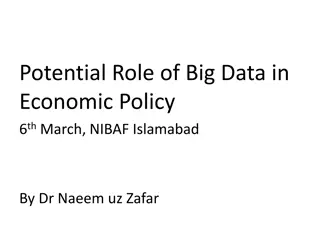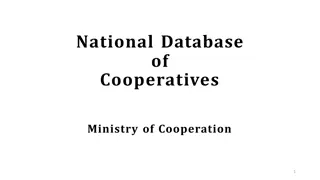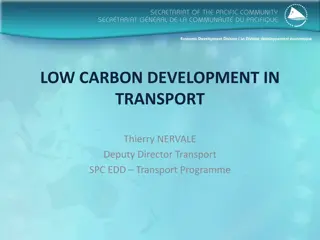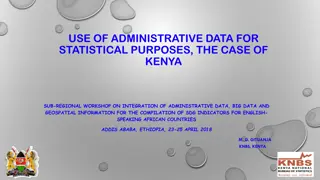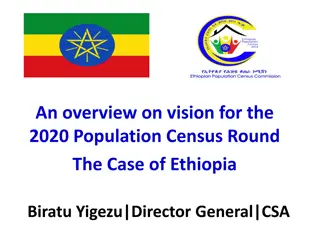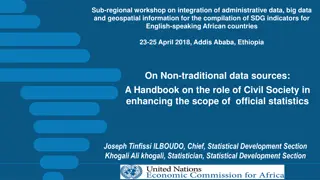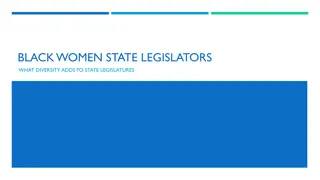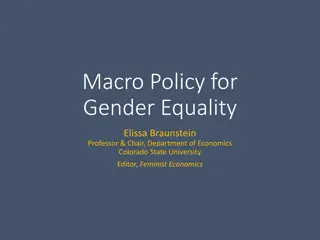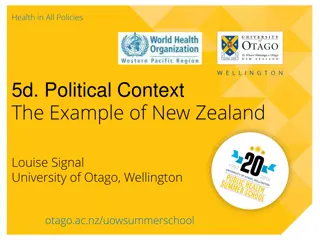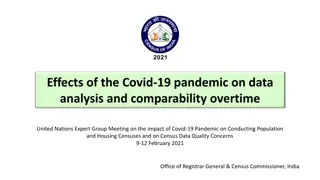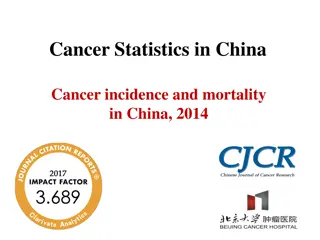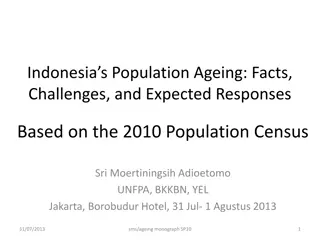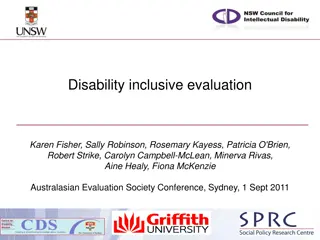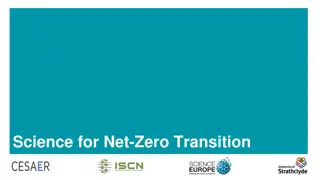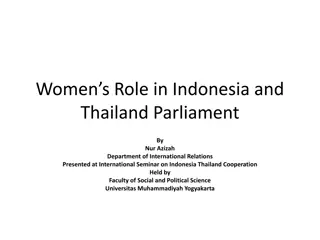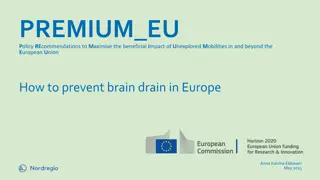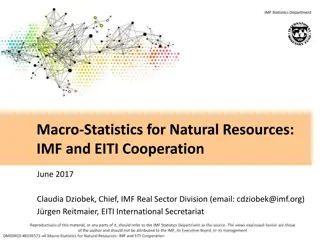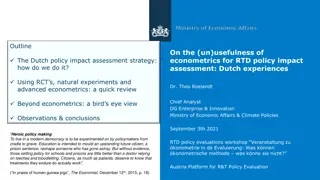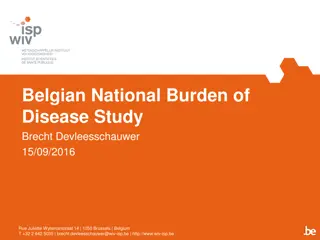Harnessing Citizen-Generated Data for Sustainable Development Goals
Citizen-generated data (CGD) presents a valuable opportunity to supplement official statistics and fill data gaps for monitoring progress towards SDGs. This alternative data source empowers citizens, fosters inclusive policymaking, and creates new spaces for engagement. By leveraging CGD, government
0 views • 14 slides
Geospatial Comparison of Economic Change and Climate Disasters in Asia-Pacific
This study explores the impact of natural disasters on economic indicators in Southern and Western Asian countries over time, aiming to assist in policy-making by understanding the relationship between natural disasters and the economy. It discusses the increasing incidences of extreme weather event
4 views • 18 slides
Addressing Housing Insecurity: Efficiency vs. Equity
Today's lesson delves into the pressing issue of housing insecurity affecting over 650,000 Americans. The discussion covers economic efficiency and equity, emphasizing the need for balanced policymaking. Two options are presented: expanding an existing homeless shelter to accommodate more individual
0 views • 12 slides
Potential Role of Big Data in Economic Policy
Over the past two decades, there has been a significant proliferation of big data, leading to the emergence of new challenges and opportunities in economic policy formulation. The use of big data, with its three defining characteristics (volume, velocity, and variety), poses questions about the futu
3 views • 26 slides
Understanding Research: Importance and Common Problems Unveiled
Delve into the realm of research with insights on its importance, the vital steps involved, and common challenges faced today. Learn about the significance of choosing the right topic, collecting data, and presenting findings. Discover how research contributes to knowledge, practice, and policymakin
0 views • 74 slides
National Database of Cooperatives: Ministry of Cooperation Initiatives
The Ministry of Cooperation is developing a National Database of Cooperatives to enhance transparency, governance, and policymaking in the cooperative sector. The database aims to provide comprehensive information on cooperatives across sectors, improve coordination among stakeholders, and facilitat
0 views • 22 slides
Advancing Low Carbon Development in Sustainable Transport
Thierry Nervale, Deputy Director of the Transport SPC EDD Programme, highlights the importance of sustainable transport in achieving economic growth, social equity, and environmental preservation. The UN Conference on Sustainable Development underscores the central role of transportation in sustaina
4 views • 17 slides
Trends in Cycling: Historical Evolution and Impact of Pandemic
Cycling has witnessed significant growth over the past two decades, with a doubling in cycling levels from 2000 to 2015. This growth was partly fueled by a shift towards sustainable travel. However, recent data suggests a plateau in cycling levels. The pandemic led to a surge in weekend cycling acti
0 views • 7 slides
Utilizing Administrative Data for Statistical Analysis in Kenya's National Statistical System
Kenya National Bureau of Statistics (KNBS) employs administrative data for statistical purposes, as highlighted in the sub-regional workshop on integrating administrative data, big data, and geospatial information for compiling SDG indicators. The legal and institutional framework, data collection m
0 views • 21 slides
Churn Prediction for Urban Migrants: Integrating Mobile Communication Networks
Urban migration poses challenges such as segregation and social inequality. This study explores migrant integration using mobile communication data, focusing on the initial period and early departure rates of new migrants in Shanghai. Insights into classification trends and departure patterns provid
0 views • 30 slides
Vision for the 2020 Population Census: Ethiopia's Development Strategy
Ethiopia aims to become a low middle-income country by 2025 by focusing on economic growth and statistical development. The National Strategy for the Development of Statistics aligns with the country's goals, emphasizing the importance of reliable data. The 2018 Population Census plays a crucial rol
0 views • 15 slides
Handbook on Civil Society's Role in Enhancing Official Statistics
Handbook explores the integration of civil society data sources into national statistical systems, advocating for greater citizen participation and transparency in socio-economic processes. It emphasizes the benefits of incorporating non-traditional data for effective policymaking and monitoring of
0 views • 13 slides
Energy Regulation: Roles and Responsibilities in February 2017
Explore the roles and responsibilities of an energy sector regulator, including setting electricity rates, system planning, consumer protection, and market oversight. Learn about centralized vs. distributed regulation benefits and building a decentralized regulatory team. Access references for furth
0 views • 7 slides
Handbook on Integrating Business and Trade Statistics
The Handbook on Integrating Business and Trade Statistics aims to provide guidance on the integration of business and trade data to enhance policymaking and understanding the impact of globalization and international trade. It covers conceptual frameworks, methodological practices, and new indicator
0 views • 11 slides
Understanding Political Parties: Roles and Functions
Political parties play a crucial role in the democratic process by serving as a linkage institution between citizens and the government. They function to pick candidates, run campaigns, give cues to voters, articulate policies, and coordinate policymaking. Parties are composed of the electorate, org
0 views • 19 slides
Importance of Diversity in State Legislatures
Legislatures with higher proportions of women and minorities tend to sponsor and pass legislation that caters to the interests of underrepresented groups. However, the marginalization of women and minority legislators by their white male colleagues can limit their influence in policymaking. Intersec
0 views • 12 slides
Gender Inequality and Macroeconomic Policy
Exploring the differential impacts of macroeconomic structures and policies on gender equality, this analysis delves into issues such as gender-biased access to resources, labor-intensive export orientation, and the effects of inflation targeting. It highlights how women, especially in marginalized
0 views • 14 slides
Policy Considerations for New Activities in Outer Space
Exploring the policy implications of upcoming missions to asteroidal and lunar destinations, this presentation discusses the fundamental goals of space activities, including science, settlement, security, and sales. It explores trade-offs in policymaking and different actors' strategies, highlightin
0 views • 11 slides
Understanding the Political Context of Public Health in New Zealand
This paper delves into the political landscape of public health in New Zealand, emphasizing the importance of analyzing political influences to enhance public health initiatives. It explores various theories such as Interest Group Theory, Institutional Theory, and Theory of Political Economy to unde
0 views • 20 slides
Impact of Covid-19 on Census Data Analysis: Insights from the UN Expert Group Meeting
The Covid-19 pandemic has significantly affected data analysis and comparability over time, particularly in the context of population and housing censuses. This impact was discussed at the United Nations Expert Group Meeting in February 2021, focusing on the challenges faced in conducting these cens
0 views • 16 slides
Cancer Statistics in China: Incidence and Mortality Report 2014
The National Central Cancer Registry of China provided a comprehensive overview of cancer burden in China in 2014. The report covers nationwide cancer incidence, mortality rates, estimated new cases and deaths, geographic distribution, and leading cancer types by age and sex. Valuable data for evide
0 views • 20 slides
Understanding Indonesia's Population Ageing: Trends, Challenges, and Responses
The monograph explores Indonesia's population ageing based on the 2010 Census, highlighting demographic shifts, social and economic consequences, and policy recommendations. It delves into the causes such as demographic transition, mortality decline, fertility trends, and age structural changes. The
0 views • 41 slides
Enhancing Disability Inclusive Evaluation Practices for Better Outcomes
This presentation delves into the importance of inclusive evaluation methodologies for individuals with disabilities. It discusses the significance of incorporating lived experiences, enhancing access to information, improving data analysis, and promoting broader engagement in research and evaluatio
0 views • 8 slides
Natural Capital Policy in Scottish Government: Evidence-Based Policymaking
This presentation explores how the Natural Capital approach influences decision-making for sustainable transitions in the Scottish Government. It delves into the role of Natural Capital in challenging or reinforcing the assetisation of the environment, aiming to understand its usage in policymaking
0 views • 13 slides
Science for Net-Zero Transition Symposium Highlights
The Science for Net-Zero Transition symposium, held during COP26, emphasized the critical need for interdisciplinary research and education programs to address the climate challenge. The event showcased experiences and viewpoints from high-level speakers, advocating for a rapid societal transformati
0 views • 10 slides
Challenges and Solutions in Eurozone Monetary Policymaking
Addressing the issues within the Eurozone monetary policy framework, the article explores concerns related to fiscal soundness, output gaps, and the role of countries like Germany. It emphasizes the need for tailored approaches, fiscal discipline, and potential reforms to achieve stability and growt
0 views • 10 slides
Insights from 2020 National Survey on Drug Use and Health
The 2020 National Survey on Drug Use and Health (NSDUH) provides extensive data on substance use, mental health, and treatment services in the United States. It covers various populations but excludes children under 12 and institutionalized groups. The survey offers valuable information for decision
0 views • 58 slides
A Comparative Analysis of Parental Leave Policies in Slovenia and Sweden
This study compares the parental leave policies of Slovenia and Sweden, highlighting key similarities and differences. Lessons from the comparison include the early establishment of paid maternity leave in both countries, the involvement of various stakeholders in policymaking, and the differing app
0 views • 9 slides
Enhancing Evidence-Informed Policy Capacity for Post-Pandemic Europe
The project focuses on building capacity for evidence-informed policymaking in governance and public administration for a post-pandemic Europe. It aims to integrate evidence, science, and evaluation in policymaking to enhance institutional awareness and capacity. The multi-country initiative involve
0 views • 12 slides
Women's Role in Parliament: A Comparative Study of Indonesia and Thailand
The article analyzes the under-representation of women in the parliaments of Indonesia and Thailand, exploring the causes and impact of women's participation. It discusses the importance of women's perspectives in policymaking, with insights from Anne Phillips on the politics of presence. Additional
0 views • 16 slides
OEB Innovation Sandbox Structure & Lessons Learned
The OEB Innovation Sandbox, launched in mid-January 2019, offers support for pilots of innovative products, services, and business models. It facilitates open dialogue between the OEB and the sector, providing valuable insights for policymaking. With a dedicated internal staff team and no dedicated
0 views • 7 slides
American Evolution: From Global Power to Domestic Transformation
Explore American foreign policy, the impact of global conflicts, and domestic changes from the late 19th to the mid-20th century. Delve into policymaking, wartime decisions, societal shifts, and the nation's development as a superpower, assessing the alignment with founding ideals amidst global chal
0 views • 5 slides
Enhancing Mobility and Regional Development in the European Union
The PREMIUM EU project aims to maximize the beneficial impact of unexplored mobilities within and beyond the EU, addressing issues such as brain drain and the consequences of migration. Through three key modules, the project explores why people move, regional development dynamics, and provides a pol
0 views • 5 slides
IMF Statistics Department - Natural Resources Statistical Tools
IMF Statistics Department has developed two statistical tools, the Revenue Template and National Accounts Template, to help countries analyze government revenues and natural resources in national accounts. These tools are crucial for policymaking in countries heavily reliant on natural resource reve
0 views • 9 slides
Dutch Experiences with Econometrics in RTD Policy Impact Assessment
Dutch policy impact assessment relies on a mix of RCTs, natural experiments, and advanced econometrics to evaluate the effectiveness of interventions. Dr. Theo Roelandt, Chief Analyst at the Ministry of Economic Affairs & Climate Policies, emphasizes the importance of evidence-based policymaking in
0 views • 16 slides
National Burden of Disease Study in Belgium: Overview and Tools
The Belgian National Burden of Disease Study, led by Brecht Devleesschauwer, focuses on epidemiology and public health initiatives in Belgium. The study involves survey research, disease burden assessments, and the development of tools like the DALY Calculator for health impact calculations. The stu
0 views • 14 slides



